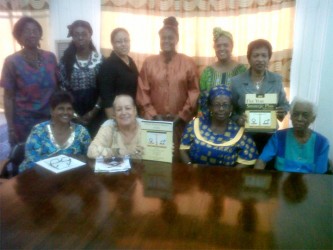The Women and Gender Equality Commission is proposing reforms for the handling of human trafficking cases.
This is among the 14 recommendations in its Third Annual Report, which was handed over to Speaker of the National Assembly Raphael Trotman on Wednesday.
Among the recommendations are that there be more sensitisation programmes

on Trafficking in Persons (TIP) and Sexual Offences and provision for written protocols for TIP cases and that all cases of TIP be dealt with by specially trained magistrates.
The commission is also recommending that there be increased fines for persons breaching the protection orders under the Domestic Violence Act, that domestic violence and sexual offences are dealt with by specially-trained magistrates and that a one-year bond and mandatory counselling from a certified provider be given to domestic violence victims who do not wish to pursue prosecution.
In addition the constitutional commission wants the National Assembly to create a policy on sexual harassment in the place of work.
Chairperson of the commission Indra Chandarpal at a press conference on Wednesday said that there were countrywide outreaches to discuss issues with all stakeholders and it is from these consultations that the recommendations were formulated.
After the presentation of the report to Trotman, Chandarpal told the press conference that members of the commission hoped that the National Assembly, after analysing the document, would see to it that the life of the constitutional body is extended.
“Certainly we would like our tenure to be extended… we are calling on all the parties to give their support to the commission to get the work done… as we have outlined in our five-year plan. We continue to work notwithstanding the many challenges,” Chandarpal said.
She added that while the commission was never informed that it would have to go she had read in the media that persons were objecting to its continued life. However, she was optimistic that after the report is given to members of the National Assembly at next week’s sitting and analysed, both parliamentarians and the public will be supportive of its existence and causes.
Chandarpal explained that while there were many financial, human resources and logistical challenges, the commission is forging ahead.
She noted that it was able to also launch a five-year strategic plan this year despite the challenges.
She said that to dissolve the commission would be premature as it has not yet been able to implement strategies outlined in the plan.
The commission hopes that the five-year plan would chart a course for it to monitor and protect the human rights of women and guard against discrimination.
The plan, launched earlier in the year, runs from 2013 to 2018 and has four priorities: the organisational and institutional strengthening of the commission; women leadership and governance; women and economic empowerment and gender-based violence.
According to the commission it provides an opportunity for the body to be introspective and refocus its approach to ensure that it can effectively address the ongoing challenges faced by its multifaceted constituencies in all sectors.





